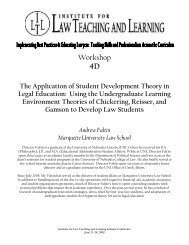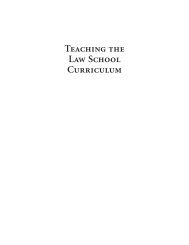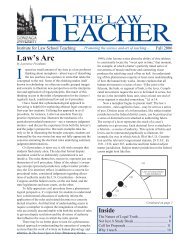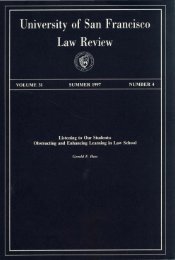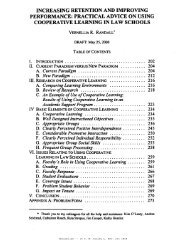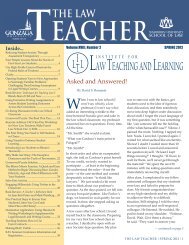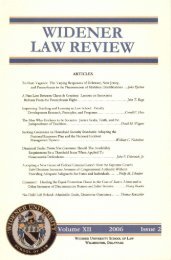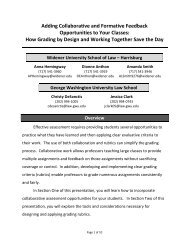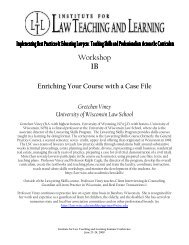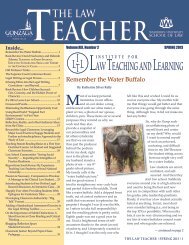Professional Skills and Values in Legal Education - Institute for Law ...
Professional Skills and Values in Legal Education - Institute for Law ...
Professional Skills and Values in Legal Education - Institute for Law ...
You also want an ePaper? Increase the reach of your titles
YUMPU automatically turns print PDFs into web optimized ePapers that Google loves.
2009] Teach<strong>in</strong>g <strong>Professional</strong> <strong>Skills</strong> <strong>in</strong> <strong>Law</strong> School 543<br />
consult with faculty members who have expertise <strong>in</strong> areas that will be<br />
addressed by the course. Likewise, the student representative may be<br />
asked to poll other students on a variety of issues that relate to course<br />
design. Students very much appreciate know<strong>in</strong>g that they are<br />
recognized as stakeholders <strong>in</strong> the design of a course that is go<strong>in</strong>g to help<br />
them build the bridge from law school to the practice of law. It is also<br />
important <strong>for</strong> the committee to keep the dean <strong>and</strong> the rest of the faculty<br />
fully <strong>in</strong><strong>for</strong>med by issu<strong>in</strong>g progress reports <strong>and</strong> solicit<strong>in</strong>g feedback via email<br />
or at faculty meet<strong>in</strong>gs. Successful skills <strong>and</strong> professionalism<br />
courses need support of the faculty, adm<strong>in</strong>istration, <strong>and</strong> students.<br />
F<strong>in</strong>ally, it is helpful to have an ongo<strong>in</strong>g advisory committee, after the<br />
course is designed <strong>and</strong> approved, to provide monitor<strong>in</strong>g <strong>and</strong> <strong>in</strong>put.<br />
Cont<strong>in</strong>u<strong>in</strong>g assessment is the key to cont<strong>in</strong>uous improvement, <strong>and</strong><br />
cont<strong>in</strong>u<strong>in</strong>g communication is the key to cont<strong>in</strong>uous support of faculty,<br />
students, <strong>and</strong> adm<strong>in</strong>istration.<br />
C. Decide How Student Per<strong>for</strong>mance Will Be Assessed<br />
A course <strong>in</strong> practice skills <strong>and</strong> values can be graded accord<strong>in</strong>g to the<br />
law school's prevail<strong>in</strong>g grad<strong>in</strong>g system or by an alternative method<br />
tailored to the nature of the course. On the one h<strong>and</strong>, employ<strong>in</strong>g the<br />
school's st<strong>and</strong>ard grad<strong>in</strong>g system enhances the status of the skills <strong>and</strong><br />
professionalism course as a "real" course. Faculty <strong>and</strong> students may<br />
take the course more seriously if it fits with<strong>in</strong> the school's normal<br />
grad<strong>in</strong>g scheme. On the other h<strong>and</strong>, the course may not lend itself to<br />
traditional assessment of student per<strong>for</strong>mance through graded<br />
exam<strong>in</strong>ations or papers. For example, much of the Phoenix School of<br />
<strong>Law</strong>'s General Practice <strong>Skills</strong> course <strong>in</strong>volves collaborative work by the<br />
students simulat<strong>in</strong>g a small law firm. Furthermore, the General Practice<br />
<strong>Skills</strong> faculty consists of practic<strong>in</strong>g attorneys, who have little experience<br />
or education <strong>in</strong> grad<strong>in</strong>g student per<strong>for</strong>mance. However, practitioner<br />
faculty members are able to provide mean<strong>in</strong>gful feedback to students on<br />
their skill simulations <strong>and</strong> draft<strong>in</strong>g exercises. Consequently, Phoenix<br />
School of <strong>Law</strong> chose to grade its course on a pass/fail system based on<br />
students' completion of all writ<strong>in</strong>g assignments, attendance, <strong>and</strong><br />
proficiency <strong>in</strong> demonstrat<strong>in</strong>g the skills <strong>and</strong> values <strong>in</strong> each module. The<br />
faculty teams provide detailed feedback on oral <strong>and</strong> written student<br />
per<strong>for</strong>mances <strong>and</strong> on the professional values reflected <strong>in</strong> students'<br />
decision mak<strong>in</strong>g. II 5<br />
115 Faculty feedback to students is generally of two types: (1) immediate oral feedback<br />
after a skill has been practiced by a student or group of students <strong>and</strong>, (2) oral <strong>and</strong> written<br />
feedback on draft<strong>in</strong>g assignments. Faculty feedback often consists of faculty demonstrat<strong>in</strong>g<br />
an "alternative" or "better" way of per<strong>for</strong>m<strong>in</strong>g a skill exercise as well.



